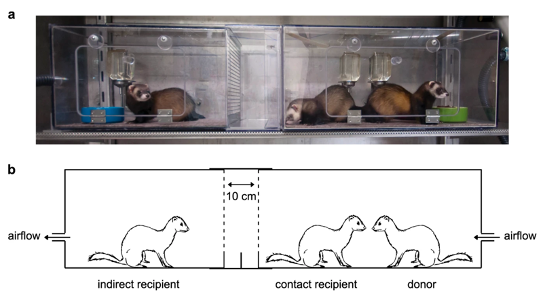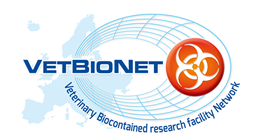COVID-19 statement by VetBioNet partners
 COVID-19 is first and foremost a human infectious disease that, due to its pandemic spread and its often fatal consequences, has sparked an unprecedented research response by the scientific community worldwide. Despite being perceived as a human disease and Public Health issue, COVID-19 is actually caused by a zoonotic viral pathogen (SARS-CoV-2) that originated from bats and has the ability to infect a wide range of wildlife, companion or farm animals (including fruit bats, non-human primates, ferrets, minks, racoon dogs, big cats, domestic cats, tree shrews, hamsters, rabbits and cattle). Hence, COVID-19 presents a typical ‘One Health’ issue that, to be fully understood must be addressed in a Public and Veterinary Health perspective.
COVID-19 is first and foremost a human infectious disease that, due to its pandemic spread and its often fatal consequences, has sparked an unprecedented research response by the scientific community worldwide. Despite being perceived as a human disease and Public Health issue, COVID-19 is actually caused by a zoonotic viral pathogen (SARS-CoV-2) that originated from bats and has the ability to infect a wide range of wildlife, companion or farm animals (including fruit bats, non-human primates, ferrets, minks, racoon dogs, big cats, domestic cats, tree shrews, hamsters, rabbits and cattle). Hence, COVID-19 presents a typical ‘One Health’ issue that, to be fully understood must be addressed in a Public and Veterinary Health perspective.
Assembling the majority of Europe’s leading research institutes in the field of animal infectious diseases, VetBioNet strives to play an eminent role in the European research response to emerging zoonotic and/or epizootic disease threats. After the emergence of COVID-19 in autumn/winter 2019, a number of VetBioNet partners have immediately launched studies addressing critical aspects of SARS-CoV-2 infections in animals and humans.
Some notable findings from these studies are detailed in the publications listed below (click on the DOI links to access the respective manuscripts):
- Type I and III IFNs produced by the nasal epithelia and dimmed inflammation are features of alpacas resolving MERS-CoV infection
Nigeer Te Jordi Rodon, Maria Ballester, Mónica Pérez, Lola Pailler-García, Joaquim Segalés, Júlia Vergara-Alert, Albert Bensaid. Plos Pathogens. 2021. (VetBioNet partner involved: IRTA) DOI: 10.1371/journal.ppat.1009229
- SARS-CoV and SARS-CoV-2 are transmitted through the air between ferrets over more than one meter distance
Jasmin S. Kutter, Dennis de Meulder, Theo M. Bestebroer, Pascal Lexmond, Ard Mulders, Mathilde Richard, Ron A. M. Fouchier, Sander Herfst. Nature Communications 2021
- Experimental Infection of Cattle with SARS-CoV-2
- Efficacy assessment of newly-designed and locally-produced filtering facemasks during the SARS-CoV-2 pandemic
- SARS-CoV-2 is transmitted via contact and via the air between ferrets

Experimental device to study the aerosol transmission of SARS-Cov2
DOI: 10.1038/s41467-020-17367-2
- Blocking transmission of Middle East respiratory syndrome coronavirus (MERS-CoV) in llamas by vaccination with a recombinant spike protein
J. Rodon, N. M. A. Okba, N. Te, B. Van Dieren, B. Bosch, A. Bensaid, J. Segalés, B. L. Haagmans, J. Vergara-Alert. Emerging Microbes & Infections, 2019. (VetBioNet partners involved: IRTA, Erasmus MC) DOI: https://doi.org/10.1080/22221751.2019.1685912
- Detection of MERS-CoV antigen on formalin-fixed paraffin-embedded nasal tissue of alpacas by immunohistochemistry using human monoclonal antibodies directed against different epitopes of the spike protein
A. Haverkamp, B. J.Bosch, I. Spitzbarth, A. Lehmbecker, N. Te, A. Bensaid, J. Segalés, W. Baumgärtner. Veterinary Immunology and Immunopathology, 2019. (VetBioNet partner involved: IRTA) DOI: https://doi.org/10.1016/j.vetimm.2019.109939
These findings not only present important milestones in SARS-CoV-2 research (diagnostic protocols, host susceptibility, pathogenic principles, virus transmission, facemask protection and preclinical studies), they also form the basis for risk assessments and recommendations by national or international Public and Veterinary Health agencies.
More information about COVID-19 research by VetBioNet partner organisations is available on the following websites:
- Pre-clinical COVID-19 vaccine trials begin at CSIRO
- Testing susceptibility of cattle: Friedrich-Loeffler-Institut
- Wageningen University and Research : Vaccine research
- Coronavirus Hub | The Pirbright Institute
- Noldus webinar – Tools for preclinical COVID-19 research
- CISA-INIA contribution to the SARS-CoV2 diagnosis
A more comprehensive list of VetBioNet contributions on Sars-CoV2 research is available on the following link:
https://pubmed.ncbi.nlm.nih.gov/collections/59970234/?sort=pubdate

For further information about COVID-19 in animals please go to the ‘COVID-19 Portal’ provided by the OIE – The World Organisation for Animal Health. The OIE is one of the principal stakeholders of VetBioNet and represented in the project’s Stakeholder Advisory Board.

